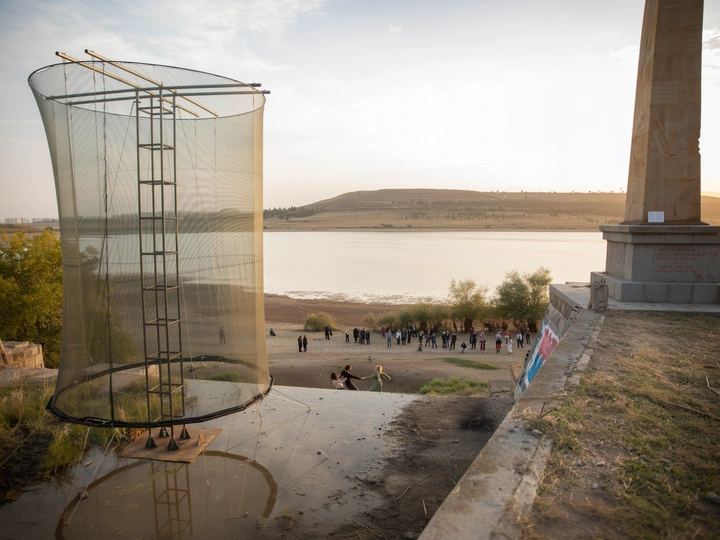Xenia: Rituals of Hospitality in Public Space

Musy Pierre
Iff Romain
Xenia is an architecture collective centered on the concept of hospitality and the inclusion of the foreign in the broadest sense. Founded in 2022, it brings together Michel Kessler, Pierre Musy, and Romain Iff, three architects based in Zurich and Geneva. Together, they explore the community-building potential of architecture by activating public space through ephemeral, symbolic, and social formats. Their practice spans from architectural and landscape competitions in Switzerland to international workshops, public rituals, and research-driven installations.
Michel Kessler is an architect based in Zurich and founder of michel.kessler+associates. His work engages with infrastructure, geopolitics, artificial intelligence, and new materials. He was awarded the 2024 Foundation Award for Innovation in Architecture and selected for the INCA residency (EU Horizon). His projects have been exhibited at the Biennale di Venezia, Sonic Matter, and GTA Exhibitions. He curates the off-space Lathouse and co-founded xenia.
Pierre Musy is an architect and videographer from Geneva. A graduate of ETH Zurich, he has worked with Baukunst and BUREAU and co-curated the independent art space BELLA. His film Desert of the Real was presented at the Lugano Territorial Biennale (2022). In 2024, he led the workshop Sample Architecture at the Winter School of the École d’architecture de la ville & des territoires Paris-Est.
Romain Iff is an architect from La Chaux-de-Fonds and ETH Zurich graduate. He has worked for Ciguë (Paris) and Jan Kinsbergen (Zurich), contributing to projects such as the Pavillon de l’Arsenal and the Campus Santé in Lausanne. His work has been shown at Arc-en-Rêve and Archizoom. In 2024, he led a workshop at Paris-Est and co-curated the event Midnight Spaces in Geneva.
Xenia is an architecture collective exploring hospitality as a spatial and symbolic act. Our name reflects our core interest: the inclusion of the foreign, not only as a sociopolitical gesture but as a framework for activating public space through rituals, encounters, and ephemeral architectures.
In 2024, we participated in the Tbilisi Architecture Biennale with a Fogcatcher pavilion built atop a decaying Soviet hydro-infrastructure. Once a monument to human dominance over nature, it now stands as a haunting ruin. We collaborated with local welders and metalworkers to construct a lightweight tensile structure using local materials and on-site improvisation. This project combined embodied knowledge, symbolic resonance, and minimal means to reanimate a neglected site.
Across projects in Armenia, Colombia, Tunisia, Georgia, Mexico, and Senegal, we continue to investigate urban thresholds and underused spaces. We engage in public rituals, collective cooking, fermentation processes, and performative settings as tools for spatial transformation. Our work is guided by an interest in the social syntax of space, exploring how architecture can host liturgical patterns such as transitions, pauses, and rhythms that resist the regime of permanent acceleration.
Architecture, for us, is a medium of collective rehearsal. By reactivating symbolic, ritual, and affective layers of space, we seek to recover modes of gathering, mourning, celebrating, and negotiating difference. Our focus lies not in permanence but in resonance.
We see our proposal not as a fixed installation but as a transferable practice. It is an evolving set of methods to transform forgotten urban edges into collective stages. In the context of LINA, we wish to develop this through translocal collaborations: site-specific performances, public meals, workshops, and spatial interventions that remain open, incomplete, and plural.